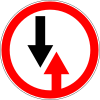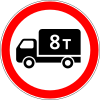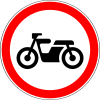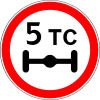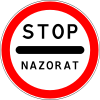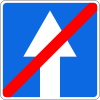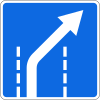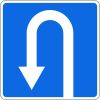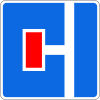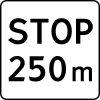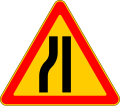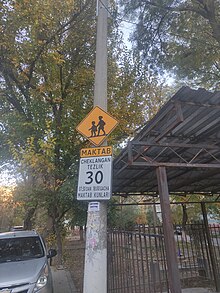
Road signs in Uzbekistan are regulated by the O'zDst 3283-2017 standard.[1] Due to the country being a former Soviet Socialist Republic between 1924 and 1991, road signs are similar in design to those used in the Soviet Union before its dissolution in 1991, as well as in most other post-Soviet states. Uzbekistan acceded to the Vienna Convention on Road Signs and Signals on January 17, 1995.[2][3] The Soviet Union itself was once a signatory to the Vienna Convention on Road Signs and Signals.[4]
Modern road signs in Uzbekistan are in many ways similar in design to road signs used in Russia and are based on the Soviet ГОСТ 10807-78[5] standard (no longer valid in Russia since January 1, 2006) and the Russian ГОСТ Р 52290-2004 standard.[6][7] The ГОСТ 10807-78 standard is still valid in Uzbekistan, but with additions. However, modern road signs in Uzbekistan also have some design features used on road signs in European countries such as Spain, Germany and Italy.[8] Inscriptions on road signs in Uzbekistan are written in Latin script only, despite the use of Cyrillic and Latin alphabets in the country.
Warning signs[edit]
- 1. Warning signs
-
1.1 Railway crossing with a barrier
-
1.2 Railway crossing without a barrier
-
1.3.1 Single-track railway
-
1.3.2 Multi-track railway
-
1.4.1 Approaching a railway crossing
-
1.4.2 Approaching a railway crossing
-
1.4.3 Approaching a railway crossing
-
1.4.4 Approaching a railway crossing
-
1.4.5 Approaching a railway crossing
-
1.4.6 Approaching a railway crossing
-
1.5 Trams
-
1.6 Intersection of equivalent roads
-
1.7 Roundabout
-
1.8 Traffic signals
-
1.9 Opening bridge
-
1.10 Departure to the embankment
-
1.11.1 Dangerous curve to the right
-
1.11.2 Dangerous curve to the left
-
1.12.1 Dangerous curves
-
1.12.2 Dangerous curves
-
1.13 Steep descent
-
1.14 Steep climb
-
1.15 Slippery road
-
1.16 Uneven road
-
1.17 Gravel surface
-
1.18.1 Road narrows on both sides
-
1.18.2 Road narrows on the right
-
1.18.3 Road narrows on the left
-
1.19.1 Two-way traffic
-
1.20 Pedestrian crossing ahead
-
1.21 Children
-
1.22 Intersection with a bike path or bike and pedestrian path
-
1.23 Roadworks
-
1.24 Cattle
-
1.25 Wild animals
-
1.26 Falling rocks surface
-
1.27 Side wind
-
1.28 Low-flying aircraft
-
1.29 Accident danger zone
-
1.30 Other hazards
-
1.31 Speed bump
-
1.31.1 Hazard chevron
-
1.31.2 Hazard chevron
-
1.31.3 Hazard chevron
-
1.34 Attention, the device blocking the railway crossing
Priority signs[edit]
- 2. Priority signs
-
2.1 Priority road
-
2.2 End of priority road
-
2.3.1 Intersection with a secondary road
-
2.3.2 Secondary road junction
-
2.3.3 Secondary road junction
-
2.4 Give way
-
2.5 Stop sign
-
2.6 Give way to oncoming traffic
-
2.7 Priority over oncoming traffic
Prohibitory signs[edit]
- 3. Prohibitory signs
-
3.1 Entry is prohibited
-
3.2 Traffic is prohibited
-
3.3 The movement of motor vehicles is prohibited
-
3.4 Lorries exceeding indicated weight prohibited
-
3.5 The movement of motorcycles is prohibited
-
3.6 The movement of tractors is prohibited
-
3.7 Driving with a trailer is prohibited
-
3.8 The movement of horse-drawn carts is prohibited
-
3.9 Cycling is prohibited
-
3.10 Pedestrian traffic is prohibited
-
3.11 Vehicle weight limit
-
3.12 Limitation of the mass per axle of the vehicle
-
3.13 Height limit
-
3.14 Width limit
-
3.15 Length limit
-
3.16 Limitation of the minimum distance
-
3.17.1 Customs
-
3.17.2 Danger
-
3.17.3 Control
-
3.18.1 Turning to the right is prohibited
-
3.18.2 Turning to the left is prohibited
-
3.19 U-turn is prohibited
-
3.20 Overtaking is prohibited
-
3.21 End of overtaking prohibition zone
-
3.22 Overtaking by trucks is prohibited
-
3.23 End of the zone prohibiting overtaking RU trucks
-
3.24 Maximum speed limit
-
3.25 End of the maximum speed limit zone
-
3.26 Beeping is prohibited
-
3.27 Stopping is prohibited
-
3.28 Parking is prohibited
-
3.29 Parking is prohibited on odd days of the month
-
3.30 Parking is prohibited on even days of the month
-
3.31 End of all restrictions zone
-
3.32 The movement of vehicles with dangerous goods is prohibited
-
3.33 No vehicles with explosive and flammable loads
Mandatory signs[edit]
- 4. Mandatory signs
-
4.1.1 Driving straight
-
4.1.2 Turn right
-
4.1.3 Turn left
-
4.1.4 Proceed straight or turn right
-
4.1.5 Proceed straight or turn left
-
4.1.6 Turn right or left
-
4.2.1 Keep right
-
4.2.2 Keep left
-
4.2.3 Keep right or left
-
4.3 Direction of roundabout traffic
-
4.4 Passenger car traffic
-
4.5 Bicycle path
-
4.6 Footpath
-
4.7 Minimum speed limit
-
4.8 End of the minimum speed limit zone
-
4.9.1 Direction of movement of vehicles with dangerous goods (turn left)
-
4.9.2 Direction of movement of vehicles with dangerous goods (proceed straight)
-
4.9.3 Direction of movement of vehicles with dangerous goods (turn right)
Information signs[edit]
- 5. Information signs
-
5.1 Motorway
-
5.2 End of the motorway
-
5.3 Road for cars
-
5.4 End of the road for cars
-
5.5 One-way road
-
5.6 End of one-way road
-
5.7.1 Exit to a one-way road
-
5.7.2 Exit to a one-way road
-
5.8.1 Lane directions
-
5.8.2 Lane directions
-
5.8.2 Lane directions
-
5.8.2 Lane directions
-
5.8.2 Lane directions
-
5.8.2 Lane directions
-
5.8.2 Lane directions
-
5.8.2 Lane directions
-
5.8.3 The beginning of the lane
-
5.8.3 The beginning of the lane
-
5.8.4 The beginning of the lane
-
5.8.5 End of the lane
-
5.8.6 End of the lane
-
5.8.7 Lane direction
-
5.8.7 Lane direction
-
5.8.8 Lane direction
-
5.8.8 Lane direction
-
5.9 Bus lane
-
5.10.1 A road with a line for fixed-route vehicles
-
5.10.2 End of the road with a lane for fixed-route vehicles
-
5.10.3 Exit to the road with a lane for fixed-route vehicles
-
5.11.1 U-turn
-
5.11.2 U-turn
-
5.12 Bus and/or trolleybus stop location
-
5.13 Tram stop location
-
5.14 Taxi stop
-
5.15 Parking
-
5.16.1 Pedestrian crossing
-
5.16.2 Pedestrian crossing
-
5.17.1 Subway (underpass)
-
5.17.2 Subway (underpass)
-
5.17.3 Footbridge
-
5.17.4 Footbridge
-
5.18 Recommended speed
-
5.19.1 Dead end
-
5.19.2 Dead end
-
5.19.3 Dead end
-
5.20.1 A preliminary sign of directions
-
5.20.1 A preliminary sign of directions
-
5.20.2 A preliminary sign of direction
-
5.20.3 Traffic scheme
-
5.21.1 Pointing direction
-
5.21.1 Pointing direction
-
5.21.2 Pointing directions
-
5.22 Entrance to built-up area
-
5.23 End of built-up area
-
5.24 Entrance to locality
-
5.25 End of locality
-
5.26 Object name (river name)
-
5.26 Object name (street name)
-
5.27 Distance indicator
-
5.28 Kilometer sign
-
5.29.1 Route number
-
5.29.1 Route number
-
5.29.2 Route number and direction
-
5.29.2 Route number and direction
-
5.29.2 Route number and direction
-
5.30.1 Direction of movement for trucks
-
5.30.2 Direction of movement for trucks
-
5.30.3 Direction of movement for trucks
-
5.31 Detour scheme
-
5.32.1 Detour direction
-
5.32.2 Detour direction
-
5.32.3 Detour direction
-
5.33 Stop line
-
5.34.1 Preliminary indicator for changing lanes onto another roadway
-
5.34.2 Preliminary indicator for changing lanes onto another roadway
-
5.35 Reversible lane
-
5.36 End of reversible lane
-
5.37 Exit to the road with reversible lane
-
5.38 Residential area
-
5.39 End of residential area
-
5.40 Emergency stopping
-
5.41 Photo- and video traffic control
-
5.42 Turn right on red light
-
5.43 Radar
Service signs[edit]
- 6. Service signs
-
6.1 Point of medical care
-
6.2 Hospital
-
6.3 Gas station
-
6.4 Vehicle maintenance
-
6.5 Car washing
-
6.6 Phone
-
6.7 Food point
-
6.8 Drinking water
-
6.9 Hotel or motel
-
6.10 Camping
-
6.11 Place of rest
-
6.12 State Traffic Inspectorate (YPX)
-
6.13 International road transport control
-
6.15 Waste collection point
Additional panels[edit]
- 7. Additional plates
-
7.1.1 Distance to the object
-
7.1.2 Distance to the object
-
7.1.3 Distance to the object
-
7.1.4 Distance to the object
-
7.2.1 Coverage area
-
7.2.2 Coverage area
-
7.2.3 Coverage area
-
7.2.4 Coverage area
-
7.2.5 Coverage area
-
7.2.6 Coverage area
-
7.3.1 Directions of action
-
7.3.2 Directions of action
-
7.3.3 Directions of action
-
7.4.1 Type of vehicle
-
7.4.2 Type of vehicle
-
7.4.3 Type of vehicle
-
7.4.4 Type of vehicle
-
7.4.5 Type of vehicle
-
7.4.6 Type of vehicle
-
7.4.7 Type of vehicle
-
7.4.8 Type of vehicle
-
7.5.1 Saturdays, Sundays and holidays
-
7.5.2 Working days
-
7.5.3 Days of the week
-
7.5.4 Validity period
-
7.5.5 Validity period
-
7.5.6 Validity period
-
7.5.7 Validity period
-
7.6.1 Method of parking the vehicle
-
7.6.2 Method of parking the vehicle
-
7.6.3 Method of parking the vehicle
-
7.6.4 Method of parking the vehicle
-
7.6.5 Method of parking the vehicle
-
7.7 A place to park without using the engine
-
7.8 Paid services
-
7.9 Limitation of parking duration
-
7.10 Place for car inspection
-
7.11 Limitation of the permitted maximum mass
-
7.12 Dangerous roadside
-
7.13 Direction of the main road
-
7.14 Traffic lane
-
7.15 Blind pedestrians
-
7.16 Wet coating
-
7.17 Disabled people
-
7.18 Except for disabled people
-
7.19 Photo- and video traffic control
-
7.20 Dangerous goods category
Temporary signs[edit]
Temporary warning, priority and prohibition signs differ from permanent ones in that they have a yellow background instead of white.
-
1.15 Slippery road
-
1.17 Gravel surface
-
1.18.1 Road narrows on both sides
-
1.18.2 Road narrows on the right
-
1.18.3 Road narrows on the left
-
1.23 Roadworks
-
1.31 Speed bump
-
2.6 Give way to oncoming traffic
-
3.12 Limitation of the mass per axle of the vehicle
-
3.20 Overtaking is prohibited
-
3.24 Maximum speed limit
References[edit]
- ^ "Нормативные документы". ekspertiza.uz (in Russian).
- ^ "United Nations Treaty Collection". treaties.un.org. Retrieved 2024-02-22.
- ^ "Vienna Convention on Road Signs and Signals - unece" (PDF). United Nations Economic Commission for Europe (UNECE). UNITED NATIONS. Retrieved 12 July 2018.
- ^ "КОНВЕНЦИЯ О ДОРОЖНОМ ДВИЖЕНИИ от 08.11.1968 Вена | ATI.SU". ati.su (in Russian). Retrieved 2023-11-24.
- ^ "ГОСТ 10807-78 Знаки дорожные. Общие технические условия (с Изменениями N 1-6) - docs.cntd.ru". docs.cntd.ru. Retrieved 2023-03-16.
- ^ "ГОСТ Р 52290-2004 Технические средства организации дорожного движения. Знаки дорожные. Общие технические требования (с Поправками, с Изменениями N 1, 2, 3) - docs.cntd.ru". docs.cntd.ru. Retrieved 2023-03-20.
- ^ "Скачать ГОСТ Р 52290-2004 Технические средства организации дорожного движения. Знаки дорожные. Общие технические требования". meganorm.ru (in Russian). Retrieved 2023-03-25.
- ^ "General technical conditions of road signs used in Uzbekistan". ResearchGate. Retrieved 2023-09-02.

















































